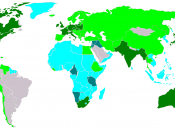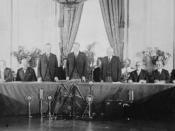"The United States was not really isolationist in the 1930's".
Argue the case for or against this statement.
During the 1920's America seemed to enjoy a period of prosperity after the Great War. This was due to a number of factors. One of which was American industry which had expanded and "mass production" methods allowed prices of goods to drop. The American people who had money spent it lavishly, whilst those who did not borrowed in order to do so. The introduction of hire purchase was another factor which led to major problems when the Great Depression set in. Although America was the only nation to come out of World War One seemingly more affluent than any other participating nations, it did not last. The 1930's were a time when unemployment rose, wages decreased and the whole country felt it. This can be seen as one reason why America appeared to become isolated from global affairs during the 1930's.
Many Americans were more concerned with trying to feed themselves and their families, rather than worrying about what was taking place in Europe and Asia.
Another major cause for many Americans to take an isolationist ideology was the bad feeling the Great War had left. They believed that America had been dragged into the "foreign war" and the sacrifices of men and money had been too much. This lead to a general opinion that the United States needed to stay out of any activities which might lead to involvement in another European war. So, in 1920 congress agreed not to join the League of Nations, even with President Wilson's backing of the League.
The United States did not take the action of completely isolating themselves from world events, instead they chose certain proceedings to be involved with. For example, America participating...


